|
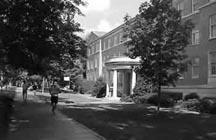
UNC Chapel Hill School of Education
|
Summary Description Six
years ago the UNC SOE decided to combine several PhD programs into one
unitary PhD program with three distinct specialty areas: Culture,
Curriculum and Change (CCC); Educational Psychology, Measurement and
Evaluation (EPME); and Early Childhood, Families and Literacy (ECFL).
Students become members of the disciplinary community through shared
core courses. They develop a professional identity through two years of
required writing seminars and the development of specific knowledge
claims within each specialty area.
UNC SOE Degree Programs
|
|
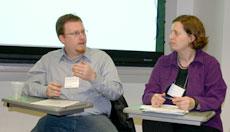
SEAES Conference
|
Tools and Resources Each
student is matched with an advisor. The advisor assists the student in
planning the Program of Studies. Students are expected to present at a
local or national conference by the end of the second year in the PhD.
Students learn which conferences are most highly attended by
individuals representing their specific areas of interest. Every other
year the UNC SOE hosts the Southeastern Association of Educational
Studies (SEAES) conference.
SOE UNC Graduate School Website
Main website page for UNC School of Education.
Dissertation Guide
Guide to dissertaion paper submissions
Inquiry Groups
This is a link to Inquiry Groups offered at the UNC SOE.
SEAES Conference website
This is the website for the SEAES conference held at UNC in Spring 2003.
|
|
|
|
Goals for Students Students
should possess a multidisciplinary awareness and subfield identity.
Through the course of the program, students should specify specific
knowledge claims. In addition to knowledge claims, students should
effectively learn the research methods appropriate to their unique
knowledge domains. Students in the school of education should gain both
a critical and a cultural approach to knowledge; students should
understand how knowledge is situated in their domains and possess
critical thinking skills.
|
|
|
Program Context Lack
of consistency across Ph.D. programs and a desire to promote
multidisciplinarity led to the creation of one Ph.D. program with three
areas of emphasis. This multidisciplinary approach provides students
with a wider range of information to better navigate the large
discipline of education. We strive to create relevant and useful core
courses, writing opportunities, and opportunities for intellectual
engagement (through inquiry groups, for example). Our current CID goals
encompass devising a plan to create more effective teacher educators.
UNC SOE Doctoral Degree Programs
This is a link to the list of doctoral degree programs in the UNC SOE.
UNC SOE Inquiry Groups
This is a link to the website about the inquiry groups offered at the UNC School of Education.
|
|
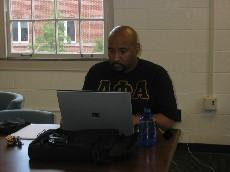
Roy Charles
|
Reflection by Roy Charles I
came to the UNC-SOE a year ago with over a decade of work experience in
Higher Education and a strong sense of who I was and wanted to be as a
professional. Through my coursework, research inquiry, interaction with
faculty, and the CID meetings (where "what it means to be a trained
professional" is discussed) I continue to refine my professional
identity. Reflection by Courtney George I
have been extremely fortunate in my doctoral journey. I have been
surrounded by supportive professors who have taken the time to teach me
about my profession -- how to act, move, think, and talk as a member of
a variety of educational discourses. I have also found a group of
friends and colleagues who, thorough work and play, are helping me find
my place in a community of educators working for social justice.
|
|
|
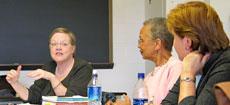
UNC SOE Faculty
|
How Do We Know? Because
students self identify their specialty areas and knowledge claims, the
content assessment for each student is unique. There are two main
methods of evaluation: student staffing and comprehensive exams.
Faculty gather and discuss student progress in staffing meetings and
provide necessary feedback to students. Each student must pass
comprehensive exams. The exams are individualized for each student by
the student-selected panel of committee members.
|
|
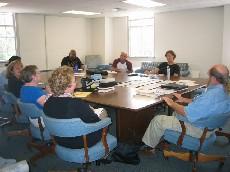
CID Meeting
|
Unanswered Questions Our discussions about what skills, knowledge, dispositions and experiences
education students should have in order to develop a professional
identity have led us to grapple with several tensions between being an
education researcher and a teacher educator. How do we create the right
mixture of research skills, content knowledge, and pedagogical
understanding for the wide range of students representing distinct
subfields in education? How do we balance the tensions between a
multidisciplinary approach and a subspecialty?
|
|
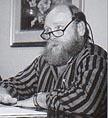
George Noblit
|
Contact Information George Noblit gwn@email.unc.edu Silvia Bettez sbettez@email.unc.edu
|
|
|